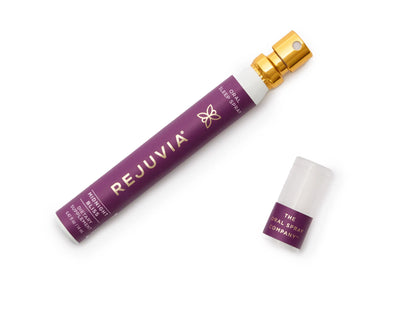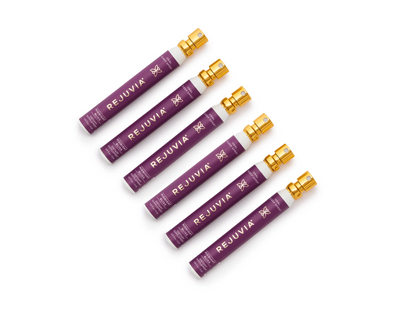Struggling with sleep? You're not alone. About 1 in 3 adults in the U.S. don’t get the recommended 7 hours per night, which can lead to serious health issues like heart disease, diabetes, and memory problems. While medications might seem like a quick fix, natural methods are safer and avoid side effects like grogginess or dependency.
Here’s how you can improve your sleep naturally:
- Understand your sleep cycles: Your body cycles through light, deep, and REM sleep stages, each playing a role in recovery and brain function.
- Create a bedtime routine: Stick to a schedule, limit screen time, and unwind with activities like reading or meditation.
- Optimize your sleep environment: Keep your room dark, quiet, and cool (65–68°F). Avoid using your bed for anything other than sleep.
- Make lifestyle changes: Exercise regularly, avoid caffeine late in the day, and get morning sunlight to regulate your internal clock.
- Consider natural aids: Fast-absorbing oral sprays like Rejuvia’s Sleep Spray can provide extra support without disrupting your body’s natural rhythms.
Start small by adjusting one or two habits at a time, and track your progress. If sleep problems persist, consult a healthcare provider to rule out underlying conditions like sleep apnea. Better sleep is within reach with consistent effort and simple changes.
Fix Your SLEEP NATURALLY: 10 Proven Tips Doctor Explains
Understanding Sleep Science
Every night, your body follows a carefully orchestrated routine, cycling through various stages of sleep that each serve a distinct purpose. By understanding these processes, you can make smarter choices about your sleep habits and spot potential disruptions to your natural rhythm.
Sleep Cycles and Circadian Rhythm
Your brain alternates between two main types of sleep: non-rapid eye movement (NREM) and rapid eye movement (REM) sleep. Over the course of a night, it cycles through these stages 4 to 6 times, with each cycle lasting about 90 minutes.
NREM sleep is divided into three stages, each progressively deeper:
- Stage N1: This is the lightest stage of sleep, lasting just 1 to 7 minutes and making up about 5% of your total sleep. It's easy to wake up during this phase.
- Stage N2: Accounting for roughly 45% to 50% of your sleep, this stage is marked by a drop in heart rate, lower body temperature, and muscle relaxation. Brain activity includes sleep spindles and K-complexes, which play a role in memory consolidation. The first N2 phase lasts about 10 to 25 minutes, with subsequent periods getting longer as the night goes on.
- Stage N3: Known as slow-wave or deep sleep, this stage is crucial for physical recovery. Early in the night, it typically lasts 20 to 40 minutes per cycle and makes up about 25% of your total sleep. Waking up during this phase can leave you feeling groggy for up to an hour.
REM sleep, which begins about 90 minutes after you fall asleep, constitutes around 25% of your total sleep time. During REM, your brain becomes highly active - almost as active as when you're awake - leading to vivid dreams. While your eyes dart rapidly under your eyelids, your muscles remain temporarily paralyzed to prevent you from acting out your dreams. The first REM period is typically brief, lasting about 10 minutes, but later periods can stretch up to an hour.
Throughout the night, the balance between these stages shifts. Deep sleep (N3) dominates the first half, while REM sleep becomes more frequent and prolonged in the second half. This pattern might explain why dreams often feel more vivid just before waking.
When these cycles are disrupted, it can lead to common sleep issues that affect millions across the United States.
Common Sleep Problems in the US
Interruptions to the sleep cycle can cause issues like insomnia or fragmented sleep. Insomnia, characterized by difficulty falling asleep, staying asleep, or waking too early, can prevent you from getting the restorative deep and REM sleep your body needs.
Many people struggle with sleep onset problems, taking 30 minutes or more to fall asleep. This delay reduces the time available for deep sleep early in the night, which is essential for physical recovery.
Frequent awakenings during the night are another common issue, fragmenting sleep cycles and reducing the time spent in each stage. This often leaves people feeling unrefreshed in the morning.
Waking up too early can further cut into REM sleep, shortening the longer REM periods that are vital for memory and emotional health.
Age-related changes in sleep patterns also play a role. Older adults tend to spend less time in both deep sleep (N3) and REM sleep. By age 65, deep sleep may nearly disappear for some, leaving many feeling less rested despite spending adequate time in bed.
Health Effects of Poor Sleep
When your sleep stages are disrupted, your body’s ability to restore itself is compromised, leading to a range of health concerns. For instance, inadequate time in N2 and REM sleep can impair memory formation.
A lack of deep sleep (N3) weakens the immune system, making you more vulnerable to illnesses and slowing recovery. Over time, chronic sleep disruption can take a toll on both physical and mental performance.
REM sleep, in particular, is crucial for managing emotions and stress. Missing out on this stage can worsen anxiety and depression, creating a cycle that further disrupts sleep.
Certain substances can also interfere with sleep quality. For example, alcohol might help you fall asleep faster, but it reduces both REM and deep sleep later in the night. Similarly, some medications, like benzodiazepines, may increase the total amount of sleep but negatively affect its quality by altering the natural sleep architecture.
Natural Ways to Improve Sleep
Sleep is essential for maintaining your overall health, and making a few natural adjustments to your habits and environment can work wonders for your sleep quality. By creating a consistent bedtime routine and tweaking your daily practices, you can set yourself up for restful nights.
Creating a Bedtime Routine
A calming bedtime routine is one of the best ways to prepare your body for sleep. Aim for a 30–60 minute wind-down period before hitting the pillow.
- Stick to a schedule. Go to bed and wake up at the same time every day, even on weekends. This helps regulate your internal clock, making it easier to fall asleep and wake up naturally.
- Limit screen time. Blue light from phones, tablets, and computers can interfere with melatonin production, the hormone that promotes sleep. Turn off devices 1 to 2 hours before bed, or use red-light filters if you need to use them.
- Unwind with a book. Reading a physical book in a dimly lit area can reduce stress and help you relax. Just make sure it’s not an overly stimulating story!
- Take a warm bath. A bath about an hour before bedtime can mimic your body’s natural temperature drop, signaling that it’s time to sleep.
- Try relaxation techniques. Deep breathing, progressive muscle relaxation, or gentle yoga can ease tension and calm your mind.
- Write it out. Journaling or making a to-do list can help clear your head of worries, making it easier to drift off.
"When evaluating sleep habits, the challenge becomes figuring out how to break the bad habit and having a plan in place if you falter. That plan must include forgiving yourself if you have slip-ups and making sure you only start with 1 or 2 routine changes at a time." - Dr. David Rosen, Sleep Medicine Physician
If you find yourself lying awake for more than 15 minutes, get out of bed and do something relaxing until you feel sleepy again.
Sleep Hygiene Practices
Once your routine is in place, fine-tuning your sleep environment can make a big difference.
- Keep it cool. Set your bedroom temperature between 65°F and 68°F (18°C to 20°C), as a cooler environment supports better sleep.
- Block out light. Use blackout curtains to eliminate light, which can disrupt melatonin production. Avoid checking clocks at night to reduce anxiety.
- Minimize noise. Use a fan or sound machine to mask sudden noises if complete silence feels unsettling.
- Incorporate calming scents. Aromatherapy with lavender, jasmine, or vanilla can create a relaxing atmosphere that encourages sleep.
- Save your bed for sleep. Avoid working, watching TV, or scrolling on your phone in bed. This helps your brain associate the bed with rest and relaxation.
Blue light exposure is a common culprit behind poor sleep. Many Americans use electronic devices right before bed, which disrupts their circadian rhythm. Try setting an alarm to remind yourself to turn off screens at least 2–3 hours before bedtime.
Lifestyle Changes for Better Sleep
Your daily habits play a significant role in how well you sleep at night. Small adjustments to your exercise, light exposure, and diet can make a noticeable impact.
- Exercise regularly - but not too late. Physical activity promotes better sleep, but avoid intense workouts close to bedtime. Aim to finish exercise in the afternoon or early evening to allow your body to wind down.
- Soak up the morning light. Bright light exposure within the first hour of waking helps regulate your sleep-wake cycle. Spend 15–30 minutes outside or near a sunny window each morning.
- Limit caffeine. Since caffeine stays in your system for hours, it’s best to avoid it after lunchtime. If you’re sensitive to caffeine, stop drinking it by 2:00 PM.
- Be mindful of alcohol. While alcohol might make you feel sleepy at first, it can disrupt your sleep later in the night. Drink in moderation and avoid it close to bedtime.
- Eat smart in the evening. Large meals before bed can cause discomfort and disrupt sleep. Opt for a light snack like yogurt, fruit, or nuts if you’re hungry before bed.
- Sip herbal tea. Non-caffeinated teas like chamomile or lavender can help you relax and prepare for sleep.
It’s worth noting that 1 in 3 people in the United States don’t get enough sleep on a regular basis. If you’re struggling, you’re not alone. These natural methods have helped many people improve their sleep without relying on medications.
The secret to better sleep lies in consistency and patience. Start with one or two changes at a time and give them at least a week to take effect. And remember, occasional setbacks are normal - be kind to yourself as you work toward better rest.
sbb-itb-de8e20a
Fast-Absorbing Oral Sprays for Sleep
Fast-absorbing oral sprays are a convenient addition to your nightly routine, especially when natural sleep habits and lifestyle changes need a little extra support. Unlike traditional pills or gummies, these sprays provide quicker results by using science-backed ingredients that encourage relaxation and improve sleep quality.
How Oral Sprays Work
Oral sprays deliver sleep-enhancing ingredients directly into the bloodstream through the mucosal lining in your mouth. When sprayed under the tongue or inside the cheek, the active ingredients skip the digestive system and liver, resulting in much faster absorption.
For example, melatonin sprays can reach peak levels in just 10–20 minutes - up to six times faster than pills. By avoiding the first-pass metabolism in the gut and liver, these sprays ensure a higher percentage of the active ingredients is available. This efficiency means smaller doses can often achieve the same effects. Plus, the metered spray design allows for precise, customizable dosing to match individual preferences.
This rapid absorption is what makes Rejuvia’s natural sleep aid so effective.
Rejuvia's All-Natural Oral Sprays

Rejuvia’s Sleep Spray offers a non-habit forming, all-natural solution for better sleep. Each bottle provides 30 servings for $39, combining convenience with reliable results - without the need for synthetic medications.
The spray is made from a vegan, non-GMO formula with a refreshing mint flavor and undergoes rigorous testing to ensure both purity and potency. Unlike pills, which can be hard to swallow, or gummies that often contain added sugars, Rejuvia’s compact spray design is easy to use and perfect for your nightstand or travel bag.
Its effectiveness lies in its carefully selected, science-backed ingredients.
Sleep-Supporting Ingredients
Rejuvia’s Sleep Spray is formulated with ingredients known for their sleep-enhancing properties. Melatonin, the key component, helps regulate your body’s natural sleep-wake cycle. Thanks to the spray’s rapid absorption, it encourages drowsiness and helps you fall asleep faster.
The formula also includes natural ingredients that promote relaxation and support longer periods of deep sleep - essential for both physical recovery and mental clarity. With precise dosing, these ingredients work together seamlessly, delivering effective sleep support without leaving you feeling groggy the next day.
Building Your Personal Sleep Plan
Creating a personalized sleep plan helps you effectively incorporate natural strategies and lifestyle changes to improve your rest. The goal is to find the right mix of habits and sleep aids that align with your specific needs and daily routine.
Tracking and Adjusting Your Sleep
Begin by observing your current sleep habits for at least a week before making any changes. Use a sleep tracker or a simple journal to log details like your bedtime, how long it takes to fall asleep, any nighttime awakenings, and how you feel in the morning. Rate your sleep quality on a scale of 1 to 10, and note factors like caffeine intake, exercise, and stress levels to identify patterns.
Once you’ve gathered this baseline data, introduce one small change and monitor its effects over a few nights. For instance, some people may notice improvements by adjusting their bedroom environment - keeping the room cool (around 65–68°F) often helps. Others might benefit from lifestyle tweaks, like eating earlier in the evening or taking a warm shower before bed. These observations will help you fine-tune a routine that works best for you.
Creating a Complete Sleep Routine
Start preparing for bed about an hour before you plan to sleep. Dim the lights, activate Do Not Disturb on your devices, and create a calm environment.
About 30–45 minutes before sleep, focus on relaxing activities like reading, meditating, or light stretching. The key is consistency over perfection. If your ideal bedtime is 10:30 PM, aim to be in bed within 15 minutes of that time - even on weekends. A regular schedule helps regulate your body’s internal clock, and even small deviations can affect your sleep quality.
It’s also helpful to have backup options in your routine. If one relaxation method isn’t working on a particular night, try alternatives like listening to soothing music, practicing deep breathing, or journaling.
When traveling, bring along items that are part of your usual sleep setup. Familiar elements - like your favorite pillow or a sleep mask - can help signal to your body that it’s time to rest, even in an unfamiliar environment.
When to Consult Healthcare Professionals
If your tailored sleep plan doesn’t lead to improvement, it might be time to seek professional advice. For example, if you consistently take over 30 minutes to fall asleep despite healthy habits, or if you feel tired during the day even after getting enough sleep, a healthcare provider can help identify underlying issues.
Certain symptoms, such as loud snoring, gasping during sleep, or waking up with headaches, could indicate conditions like sleep apnea that require medical attention. Since mental health can also play a significant role in sleep quality, it’s worth consulting a professional if stress, anxiety, or depression are contributing to your sleep challenges.
Before trying new supplements or natural sleep aids, talk to your doctor - especially if you’re on prescription medications. Sharing your sleep journal with your healthcare provider can provide valuable insights and guide their recommendations based on your unique patterns and symptoms.
Conclusion: Achieving Better Sleep Naturally
Improving your sleep naturally starts with creating consistent routines and building an environment that encourages rest. Everything from your bedroom setup to your daily habits and nighttime rituals plays a role in signaling your body that it’s time to wind down.
What works for one person might not work for another, so it’s important to find strategies that fit your lifestyle. The key is consistency - not perfection. Even small, steady adjustments can lead to noticeable improvements in your sleep quality over time. This foundation also makes it easier to explore additional tools or aids when needed.
If you're looking for extra support, fast-absorbing oral sprays can be a helpful option. For example, Rejuvia's Sleep Spray offers a non-habit-forming formula made with natural ingredients, designed to work alongside your body’s sleep processes.
Over time, these natural improvements build upon themselves, helping to balance your sleep-wake cycle. As better sleep habits take hold and supportive aids are integrated, your body becomes more adept at managing its own rhythms. This creates a positive cycle: restful nights lead to more energy during the day, which makes it easier to maintain good sleep patterns.
FAQs
How do sleep cycles and your circadian rhythm impact sleep quality?
Sleep cycles and your circadian rhythm are crucial for ensuring your sleep is truly restorative. Think of your circadian rhythm as your body's internal clock, ticking away on a 24-hour schedule. It aligns your sleep-wake patterns with the natural light and dark cycles of the day. When this rhythm is in harmony, it helps you experience deep, uninterrupted sleep and supports vital processes like brain function and cellular repair.
Meanwhile, sleep cycles are made up of different stages - light sleep, deep sleep, and REM sleep - that repeat throughout the night. These stages are essential for recharging both your body and mind. However, disruptions to your circadian rhythm or sleep cycles - like staying up late, irregular sleep schedules, or staring at bright screens before bed - can throw everything off. Over time, this can lead to poor sleep quality and even impact your overall health.
To keep these natural rhythms in check, stick to a regular bedtime routine and create a sleep-friendly environment. These small steps can make a big difference in helping you achieve truly refreshing rest.
What are some natural ways to fall asleep faster without using medication?
Falling asleep more quickly can often be achieved by tweaking a few daily habits. One effective approach is establishing a consistent bedtime routine - this helps signal to your body that it’s time to relax and prepare for sleep. Activities like deep breathing, mindfulness, or meditation can help quiet your mind and reduce stress before bed.
Your sleep environment also plays a big role. Aim to keep your bedroom cool (around 65°F), dark, and quiet for optimal rest. Natural remedies can add an extra layer of relaxation - try sipping chamomile tea, enjoying a warm glass of milk, or using lavender essential oil for calming aromatherapy. These small adjustments can make it easier to fall asleep naturally, without the need for sleep aids.
How can I tell if my sleep problems are caused by my lifestyle or a medical issue?
If you’ve been having trouble sleeping, it’s worth taking a closer look at any recent lifestyle changes. Things like heightened stress, irregular routines, or drinking caffeine or alcohol too close to bedtime can throw off your sleep. Often, these issues can be improved by adopting better sleep habits, managing stress levels, and sticking to a regular sleep schedule.
That said, if your sleep troubles continue despite these efforts - or if you notice signs like loud snoring, gasping for air while sleeping, or feeling constantly tired during the day - it could point to a medical issue, such as sleep apnea or restless legs syndrome. In such cases, reaching out to a healthcare provider for advice and an evaluation is a smart move.
Related Blog Posts
- Oral Sprays vs Pills: Absorption Speed Test
- 5 Ways Stress Ruins Your Sleep Quality
- Checklist for a Sleep-Optimized Bedroom
- Sleep Cycle Breakdown: Light, Deep, and REM






